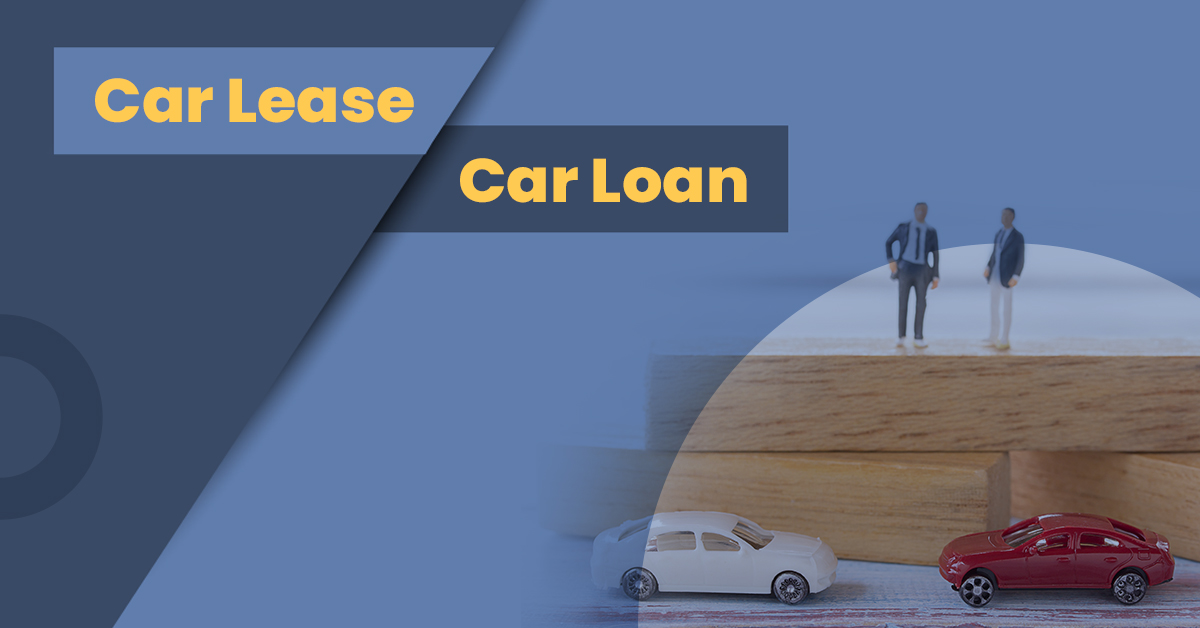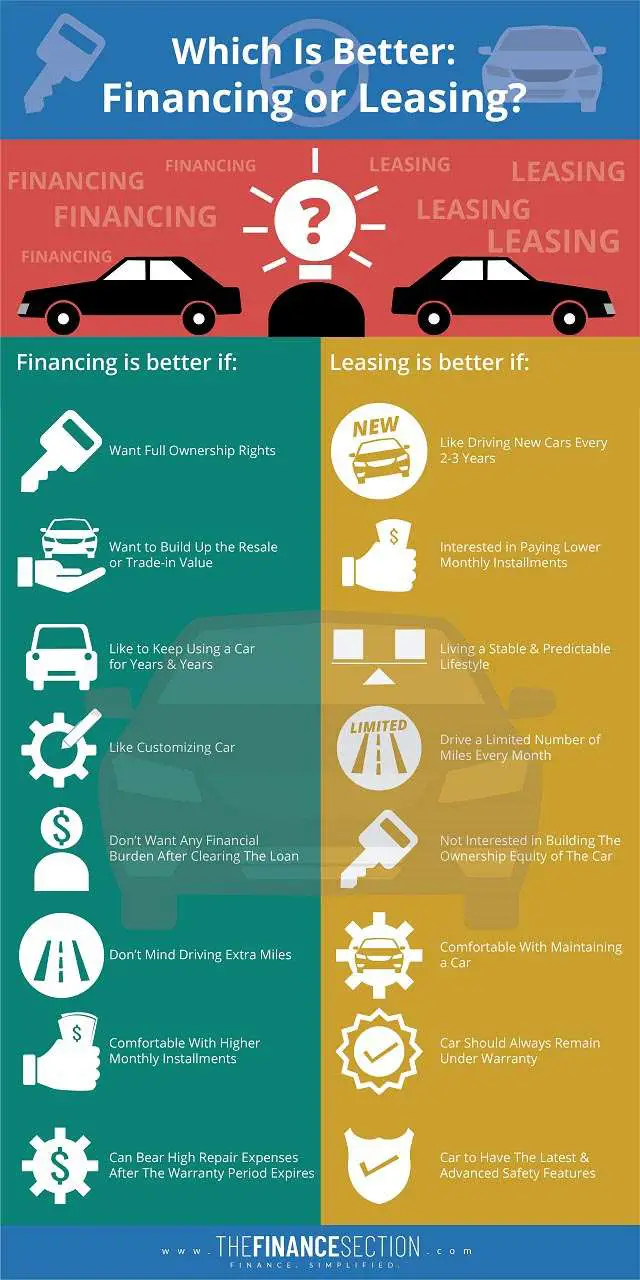
Car Loan vs. Car Lease: What’s Better for You? A Comprehensive Guide
Deciding how to acquire a new vehicle is a significant financial decision. Two popular options dominate the market: car loans and car leases. Both offer access to a vehicle, but they differ fundamentally in their structure, benefits, and drawbacks. Understanding these differences is crucial to making the right choice for your individual circumstances. This guide provides a comprehensive comparison of car loans and car leases, helping you determine which path aligns best with your needs, budget, and long-term financial goals.
Understanding Car Loans
A car loan is a traditional financing method where you borrow money from a lender (bank, credit union, or dealership) to purchase a vehicle. You repay the loan, plus interest, in fixed monthly installments over a set period, typically ranging from 36 to 72 months. Once you’ve made all the payments, you own the car outright.
Key Features of Car Loans:
- Ownership: The most significant advantage is ownership. Once the loan is paid off, you own the vehicle free and clear. You can then sell it, trade it in, or keep driving it for as long as it remains reliable.
- Building Equity: Each loan payment contributes to building equity in the vehicle. As you pay down the principal, your ownership stake increases.
- Customization: You are free to customize the vehicle as you see fit – add accessories, modify the engine, or change the paint job. There are no restrictions imposed by a leasing company.
- Mileage Freedom: You can drive as many miles as you want without incurring extra charges. This is a major benefit for individuals with long commutes or those who enjoy road trips.
- Long-Term Cost: While you build equity, the total cost of ownership can be higher due to interest charges, depreciation, and maintenance over the long term.
- Responsibility for Maintenance: You are responsible for all maintenance and repairs after the warranty expires. This can include routine maintenance like oil changes and tire rotations, as well as unexpected repairs.
- Resale Value Risk: The resale value of the vehicle can fluctuate based on market conditions, mileage, and the vehicle’s condition. You bear the risk of potentially selling it for less than you anticipated.
Understanding Car Leases
A car lease is essentially a long-term rental agreement. You pay for the use of a vehicle for a specified period (typically 24 to 48 months) and mileage allowance, but you don’t own the car. At the end of the lease term, you return the vehicle to the leasing company.
Key Features of Car Leases:
- Lower Monthly Payments: Lease payments are typically lower than loan payments for the same vehicle because you’re only paying for the depreciation of the car during the lease term, plus interest and fees.
- Access to Newer Vehicles: Leases allow you to drive a new car every few years without the hassle of selling or trading in your old vehicle.
- Warranty Coverage: Leased vehicles are usually covered by the manufacturer’s warranty for the duration of the lease, minimizing out-of-pocket expenses for repairs.
- No Resale Hassle: You don’t have to worry about the depreciation or resale value of the vehicle. Simply return it to the leasing company at the end of the lease term.
- Lower Down Payment: Leases often require a lower down payment (or sometimes no down payment at all) compared to car loans.
- Mileage Restrictions: Leases come with mileage restrictions, typically ranging from 10,000 to 15,000 miles per year. Exceeding these limits results in per-mile overage charges, which can be substantial.
- No Ownership: You never own the vehicle. At the end of the lease, you must return it, purchase it, or lease a new one.
- Wear and Tear Charges: You’re responsible for excessive wear and tear on the vehicle beyond normal use. This can include scratches, dents, interior damage, and worn tires.
- Limited Customization: You are generally not allowed to make significant modifications to a leased vehicle.
- Early Termination Penalties: Ending a lease early can be expensive, often involving significant penalties.
Comparing Key Factors: Loan vs. Lease
To make an informed decision, let’s compare the key factors of car loans and leases side-by-side:
| Feature | Car Loan | Car Lease |
|---|---|---|
| Ownership | Yes, you own the vehicle after repayment | No, you are renting the vehicle |
| Monthly Payments | Generally higher | Generally lower |
| Down Payment | Often higher | Often lower (or sometimes none) |
| Mileage Limits | No limits | Strict limits, with overage charges |
| Maintenance | Responsible for all maintenance & repairs | Typically covered by warranty during lease |
| Customization | Free to customize as desired | Limited customization allowed |
| Resale Value | You bear the risk | Leasing company bears the risk |
| Long-Term Cost | Can be higher due to interest & depreciation | Can be higher if you lease repeatedly |
| Early Termination | Can sell or trade the car | Significant penalties apply |
| Building Equity | Yes, you build equity over time | No equity is built |
Who Should Choose a Car Loan?
A car loan is a better option for you if:
- You want to own the vehicle: Ownership is your primary goal.
- You plan to keep the car for a long time: You want to drive the car for many years after the loan is paid off.
- You drive a lot of miles: You need the freedom to drive without mileage restrictions.
- You want to customize the vehicle: You plan to make modifications or add accessories.
- You prefer long-term financial stability: You want to build equity and avoid recurring lease payments.
- You don’t mind handling maintenance and repairs: You are comfortable with the responsibility of maintaining the vehicle after the warranty expires.
- You have a reliable income and good credit: This will help you secure a favorable interest rate.
Who Should Choose a Car Lease?
A car lease is a better option for you if:
- You want to drive a new car every few years: You enjoy having the latest features and technology.
- You prefer lower monthly payments: You want to minimize your monthly expenses.
- You don’t drive a lot of miles: You can stay within the mileage limits without incurring extra charges.
- You don’t want to worry about resale value: You prefer to avoid the hassle of selling or trading in a car.
- You like the idea of warranty coverage: You want to minimize out-of-pocket expenses for repairs.
- You don’t mind the restrictions of a lease: You are comfortable with mileage limits and wear-and-tear guidelines.
- You are comfortable with never owning the vehicle: Ownership is not a priority for you.
- You prioritize predictable expenses: Knowing your maintenance is covered under warranty allows for easier budgeting.
Beyond the Basics: Factors to Consider
- Credit Score: A good credit score is essential for both car loans and leases. A higher credit score will typically result in a lower interest rate on a loan or more favorable lease terms.
- Down Payment: While leases often require a lower down payment, putting more money down can reduce your monthly payments for both loans and leases.
- Interest Rates: Shop around for the best interest rates on car loans. Even a small difference in interest rate can save you thousands of dollars over the life of the loan.
- Negotiation: Negotiate the price of the vehicle, the interest rate, and the lease terms. Don’t be afraid to walk away if you’re not happy with the deal.
- Hidden Fees: Be aware of any hidden fees associated with car loans or leases, such as origination fees, acquisition fees, and disposition fees.
- Long-Term Financial Goals: Consider your long-term financial goals when deciding between a car loan and a lease. Do you want to build equity? Or do you prefer to minimize your monthly expenses?
Making the Right Choice
There’s no one-size-fits-all answer to the question of whether a car loan or a car lease is better. The best choice depends on your individual needs, circumstances, and preferences. Carefully consider the factors outlined in this guide, and take the time to compare your options before making a decision. By doing your research and understanding the pros and cons of each option, you can choose the financing method that aligns best with your financial goals and driving habits, ensuring a satisfying and cost-effective car ownership experience. Don’t hesitate to consult with a financial advisor if you need further guidance.
